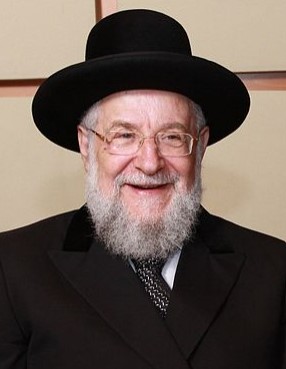
Yisrael Meir Lau, one of the youngest survivors of Buchenwald, was just eight years old when the camp was liberated. Rabbi Lau emigrated to Mandate Palestine and became the Chief Rabbi of Israel in 1993.
Rabbi Lau also served as the former Ashkenazi Chief Rabbi of Tel Aviv, Chief Rabbi of Netanya, and chairman of Yad Vashem in 2008.
Rabbi Lau comes from 37 generations of Rabbis and lives in Tel Aviv and has eight children.
Q: I thoroughly enjoyed your book Out of the Depths. How many languages was it translated into? Which was the first language to be translated?
My book was translated into 10 languages. Surprisingly, the first language it was translated into was Chinese!
(Out of the Depths is available at amazon.com)
Q: What hashgacha pratit, divine providence, did you witness during this horrific time?
I think that everything that happened during the holocaust was hashgacha pratit, divinely orchestrated by Hashem. I have no explanation as to why it happened. In my book, I describe being separated from my older brother Shmuel Yitzchak. This story is an example of hashgacha pratit. We lived in Piotrków, a central Polish town. In October 1942, the Germans gathered all the Jews to the center of town and pushed us inside the shul. I was five years old and my brother Shmuel Yitzchak was 13. It was very dark in the shul. We didn’t know what they wanted and how long we would be there. Two German officers came into the shul with a flashlight and announced that they have a list of people that need to leave the shul. When your name was called you needed to leave the shul immediately.
The two Germans stood across from one another in front of the door to count who left. They wanted to make sure that an extra person did not leave. The first name on the list was Chaya Lau. That was my mother. She did not get up or move. She had two children there. She was not going to leave them. She waited for them to call out Yisrael and Shmuel. However, our names were not on the list. When they finished reading out the list of names, she pulled me close to one side and Shmuel to her other side. She motioned to us to keep quiet. Since it was very dark in the shul, she was hoping that when she passed by the Germans it would appear like one person was leaving. However, the Germans realized that something suspicious was going on.
One of the German officers slammed his hand down and separated Shmuel from us. My mother and I fell down into a puddle of mud outside the shul and Shmuel fell back inside the shul. That was the last time that I saw Shmuel. Why is it that 75 years later, I am alive and talking with you today and sharing that my brother Shmuel was sent to Treblinka and later killed? I don’t have an explanation.
Q: Can you share with us your father’s parting words?
That same night, my father met with my older brother Naftali who was 16 at the time. My father spoke with him for three hours. They had a very deep conversation. My father said to Naftali, “I have a request for you. I am the 37th generation of Rabbis in our family. The Germans want to break this chain. If you survive this war, please act as a father to Yisrael. Promise me that you will do whatever you can to make sure the chain of Rabbis in our family continues. I will not ask you to continue the chain of Rabbis in our family since for the past few years you have not had the privilege to study in yeshiva. You have been forced to work in the factory and will have been in the camps during the war years. Yisrael, on the other hand, is five years old. He is a child. Hopefully, the war will be over in a couple of years and he will have the opportunity to study in yeshiva from a young age.” Naftali promised my father that he would.
Q: Would you be so kind as to tell us the story of how the U.S. Army chaplain Rabbi Herschel Schacter liberated you from Buchenwald?
It was April 11, 1945. The Americans came to liberate Buchenwald. The Americans were dropping bombs and the Germans were shooting back. People left the barracks and started running towards the gate to freedom. At the time my brother Naftali was very sick. He had typhus and a fever of 42 Celsius (107 Fahrenheit.) I was not with Naftali, as he was sick. I was in Block 8 with the Russians. I was with a man by the name of Feodor and he watched over me. He grabbed my hand and we began running towards the gate. When Feodor heard the Germans shooting bullets towards us, he pushed me to the ground and laid on top of me to protect me from the bullets. We arrived at the gate but it was closed.
We were not the only people who had run towards the gate. Since the gate was still locked, many people were shot down by the Germans. There was a pile of dead and badly wounded people. Somehow, I got separated from Feodor and I fell onto the pile of dead people. I was not injured but I was covered with blood. The gate opened and jeeps came in. On one of the jeeps was chaplain Rabbi Herschel Schacter. He got out of his jeep and he saw the pile of Jewish bodies. Among the pile of dead bodies, he saw a pair of eyes that were moving.
He took out his gun and went around to the other side of the pile of bodies to see who was looking at him. Maybe, it was a German trying to escape. He saw a boy that looked like he was five, although I was almost eight at the time. He put his gun back in his pocket. He asked me in Yiddish, “What is your name?” I told him my name. He asked me, “Are you related to the famous Rabbi Moshe Chaim Lau?” I told him yes.
He started to cry when he heard my answer. He saw that I was a little boy covered in blood and all alone. He asked me, “How old are you, my child?”
I said back to him, “What difference does it make how old I am? I am older than you.”
He looked at me in shock. He said to me, “Why do you think that you are older than me?”
I answered, “Because you smile and laugh like a little child. For many years I have not laughed and I do not cry anymore. So who is older you or I?”
Q: You have visited with countless global leaders such as Popes John Paul and Benedict, the Dalai Lama, Nelson Mandela, Fidel Castro, Ronald Reagan, Bill and Hillary Clinton, and Tony Blair. Can you please share with us your experience meeting President Ronald Reagan?
On April 11, 1983, I was invited to speak at the Capitol Centre in Maryland with Rabbi Herschel Schacter. Together, we shared the story of how he liberated us from Buchenwald. Rabbi Schacter shared with the audience how he found me, a young child, covered with blood, in a pile of corpses.
On stage with us was President Ronald Reagan and his wife Nancy, Gideon Hausner, who headed the team of prosecutors for the Eichmann Trial, Elie Weisel, who was liberated with us from Buchenwald and a young Israeli diplomat from the Israeli embassy, Bibi Netanyahu.
After we spoke, President Ronald Reagan came over to me and said into the microphone, “Let me touch a living legend.” He then put out his hand to shake mine.
Q: Rabbi Lau, when you and Naftali were in Buchenwald and he suggested they go to Israel, what did you think?
I asked him, “Why Israel?” Naftali answered, “We don’t have a home to return to. They took our mother, father, and brother. Israel is the home of Jews. They do not kill Jews there. When you grow up, you will understand.” I gave Naftali my hand and I went with him.
Q: After you were liberated, what was the biggest challenge you had to overcome?
Everything was new. I didn’t know the language, the culture. I also had health challenges. I was short, I had no teeth. I had not been to the dentist or doctor for six years, from the age of 2 to 8. I had to take fish oil to get stronger and healthier. It was hard to grow up in a land where you didn’t know anyone besides your brother. Also, we were separated when we arrived in Israel.
Naftali went to study in Yeshiva in Petach Tikvah and I went to live with my uncle, Rabbi Fogelman in Haifa. They took me in as a son. I lived with them for five years until I was 13 years old. After that, I went to Yeshiva Kol Torah in Yerushalayim and started fulfilling my father’s will that I continue the chain of Rabbis in our family.
Q: What can we learn from the Holocaust?
First of all, never say there is no hope. There is always hope.
If a person my age can survive and flourish despite all that I went through, then there is hope for the future.
As we say in the modim prayer, we thank Hashem for giving us life and for continuing to sustain us.
I thank Hashem for not only giving me life during the Holocaust but for also sustaining me for the past 75 years. I have been blessed to see that not only I have continued the chain of Rabbis in my family, but my son, David has done so as well. My son, Rabbi David Lau is the Ashkenazi Chief Rabbi of Israel. In addition, my other two sons are also Rabbis. I am grateful that all of my children, grandchildren, and great-grandchildren live in Israel. Last week, I celebrated the bar mitzvah of my great-grandson, Baruch!
